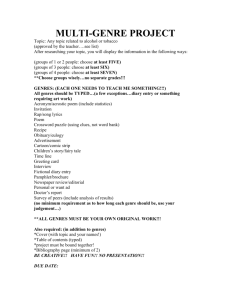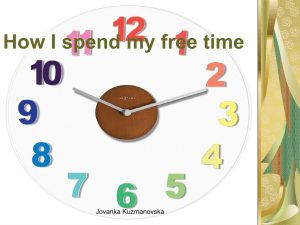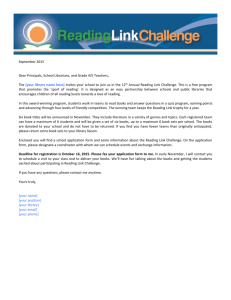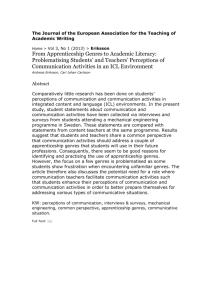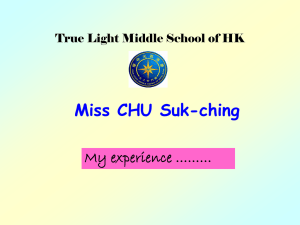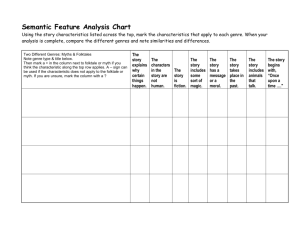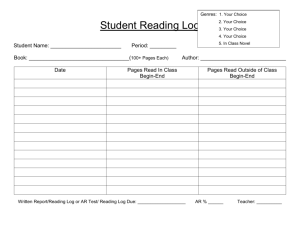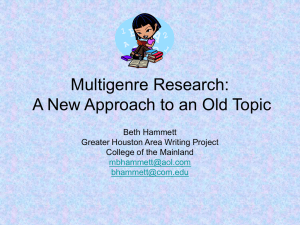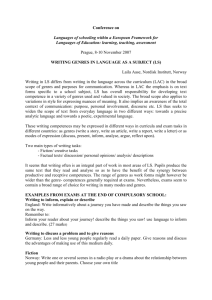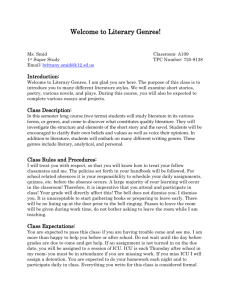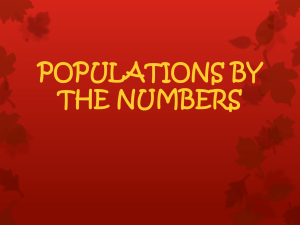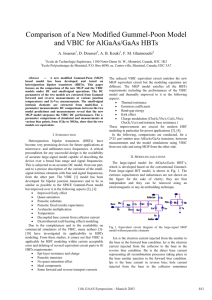Literature-Based Multigenre Research Paper
advertisement
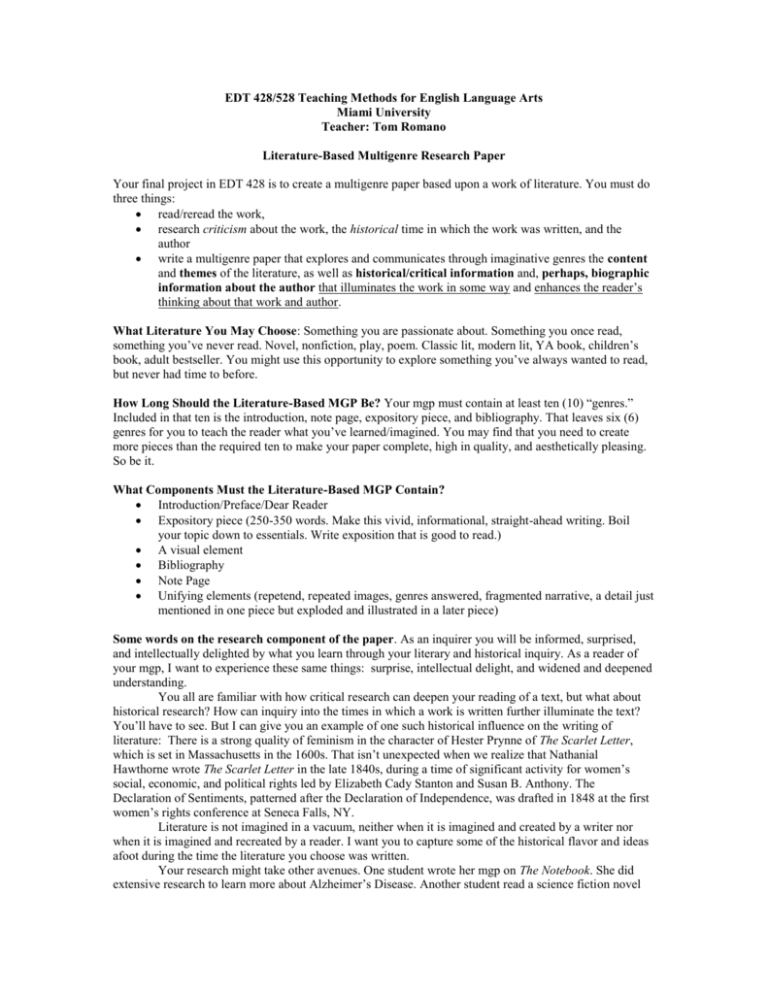
EDT 428/528 Teaching Methods for English Language Arts Miami University Teacher: Tom Romano Literature-Based Multigenre Research Paper Your final project in EDT 428 is to create a multigenre paper based upon a work of literature. You must do three things: read/reread the work, research criticism about the work, the historical time in which the work was written, and the author write a multigenre paper that explores and communicates through imaginative genres the content and themes of the literature, as well as historical/critical information and, perhaps, biographic information about the author that illuminates the work in some way and enhances the reader’s thinking about that work and author. What Literature You May Choose: Something you are passionate about. Something you once read, something you’ve never read. Novel, nonfiction, play, poem. Classic lit, modern lit, YA book, children’s book, adult bestseller. You might use this opportunity to explore something you’ve always wanted to read, but never had time to before. How Long Should the Literature-Based MGP Be? Your mgp must contain at least ten (10) “genres.” Included in that ten is the introduction, note page, expository piece, and bibliography. That leaves six (6) genres for you to teach the reader what you’ve learned/imagined. You may find that you need to create more pieces than the required ten to make your paper complete, high in quality, and aesthetically pleasing. So be it. What Components Must the Literature-Based MGP Contain? Introduction/Preface/Dear Reader Expository piece (250-350 words. Make this vivid, informational, straight-ahead writing. Boil your topic down to essentials. Write exposition that is good to read.) A visual element Bibliography Note Page Unifying elements (repetend, repeated images, genres answered, fragmented narrative, a detail just mentioned in one piece but exploded and illustrated in a later piece) Some words on the research component of the paper. As an inquirer you will be informed, surprised, and intellectually delighted by what you learn through your literary and historical inquiry. As a reader of your mgp, I want to experience these same things: surprise, intellectual delight, and widened and deepened understanding. You all are familiar with how critical research can deepen your reading of a text, but what about historical research? How can inquiry into the times in which a work is written further illuminate the text? You’ll have to see. But I can give you an example of one such historical influence on the writing of literature: There is a strong quality of feminism in the character of Hester Prynne of The Scarlet Letter, which is set in Massachusetts in the 1600s. That isn’t unexpected when we realize that Nathanial Hawthorne wrote The Scarlet Letter in the late 1840s, during a time of significant activity for women’s social, economic, and political rights led by Elizabeth Cady Stanton and Susan B. Anthony. The Declaration of Sentiments, patterned after the Declaration of Independence, was drafted in 1848 at the first women’s rights conference at Seneca Falls, NY. Literature is not imagined in a vacuum, neither when it is imagined and created by a writer nor when it is imagined and recreated by a reader. I want you to capture some of the historical flavor and ideas afoot during the time the literature you choose was written. Your research might take other avenues. One student wrote her mgp on The Notebook. She did extensive research to learn more about Alzheimer’s Disease. Another student read a science fiction novel about environmental abuse. He researched specific forms of environmental abuse taking place when the novel was written in the early 1970s. The lesson these two students provide is to not limit yourself to one predetermined slant in terms of research. Follow your curiosity and think outside the box. One Tip For Incorporating Into Your MGP What You Learn Through Your Research: Avoid simply providing quotations from research on a page. Such a move is not effective and shows little imagination or initiative on your part. Rather, incorporate into genres what you learn through research. For example, one student learned that Harper Lee was greatly influenced by the trial of nine young black men accused and convicted of raping two white women on a train during the 1920s. Harper Lee was eight-years-old at the time of the trial. In To Kill A Mockingbird, Scout is about the same age when she witnesses the trial of Tom Robinson. The student wrote a two-voiced poem to capture the similarities and differences of the true case and fictional case. One voice was Harper Lee, the other voice was Scout. As a reader I was informed and delighted to see this melding of research and imagination. What Research? I have a professional friend—an active scholar—who does 85% of his research online. But be careful. There are incredible databases available; there are a lot of websites, too, many useful, but many that are shallow, inaccurate, and misleading. The library is still an amazing storehouse of journals, magazines, newspapers, book chapters, and primary material. Incorporate what you learn from the research into your mgp—on a Note Page document how the research informs each genre of your mgp. Checkpoints when you have a genre or a think-piece due (I’m expecting a substantive piece of writing here, not just something scribbled down to turn in): Wednesday class (4/19 and 4/26); Tuesday/Thursday class: 4/18, 4/20, 4/25) Genres You Might Try Genres and subgenres abound. Remember, too, that often the most effective genres arise naturally from your material. A student writing about a novel involving bulimia, for example, began her paper with a doctor’s report for a patient with bulimia. The official form of the report was professional looking with the doctor’s name and business address appearing in a standard format and the handwritten notes of the doctor providing pertinent information about the patient’s symptoms. Here is a partial list of genres you might try: First person narrative Third person narrative Stream of consciousness Interior Monolog Dialog (written in play format) Poems for two voices Free verse Photograph poem Haiku Limerick List poem Dramatic monolog Song lyrics Alternate Style Pieces Labyrinthine sentences fragments double voice list Newspaper style hard news stories feature stories Dear Abby comic strip obituaries editorials classified ad Reviews diary/journal entries allegory character sketch brochure bumper sticker announcements directories cast lists encyclopedia entries fable game rules interviews job application letters/post cards web site home page map parodies headlines manifesto prayer quotations recipes time lines want ads menu newscast good news/bad news
